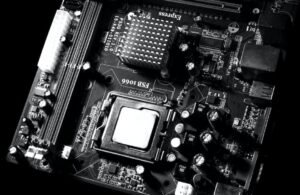Which Company Makes AI Chips
The field of artificial intelligence (AI) has seen significant advancements in recent years, and one of the crucial components powering this progress is the development of specialized AI chips. Several companies have emerged as key players in this sector, each contributing their unique offerings to the market. In this article, we will explore some of the prominent companies involved in manufacturing AI chips.
Key Takeaways:
- Multiple companies are engaged in the production of AI chips, given the growing demand for specialized hardware.
- NVIDIA, Intel, and Google are some of the prominent players in the AI chip market.
- These companies offer a range of AI chips tailored to various applications, from data centers to edge devices.
NVIDIA is a leader in the field of AI chips, specifically known for its GPUs (graphics processing units) that excel in machine learning tasks. Their GPUs are widely used in data centers and are favored by researchers and developers for their high performance and efficient parallel processing capabilities. NVIDIA’s latest GPU architectures, such as the Turing and Ampere, have made significant improvements in AI workloads, enabling faster and more accurate computations. *NVIDIA’s commitment to driving AI innovation has made them a go-to choice for many AI enthusiasts and professionals.
Intel is another major player in the AI chip market, offering a diverse range of products suited for different AI applications. Their Intel Xeon processors, combined with the Intel Deep Learning Boost (DL Boost) technology, provide efficient processing power for AI workloads. Intel FPGA (field-programmable gate array) chips are also gaining popularity due to their programmability and adaptability to specific AI tasks. *Intel’s comprehensive portfolio of AI chips caters to various industries and use cases, contributing to their widespread adoption in the AI community.
Prominent AI Chip Manufacturers
| Company | Key AI Chips | Applications |
|---|---|---|
| NVIDIA | GPU (Turing, Ampere) | Data centers, research, edge devices |
| Intel | Xeon processors, FPGA chips | Data centers, edge devices, specific AI tasks |
| Tensor Processing Units (TPUs) | Data centers, machine learning, cloud services |
Google is well-known for its efforts in AI research and applications, and they have developed their own specialized AI chips called Tensor Processing Units (TPUs). TPUs are designed to accelerate machine learning workloads and are particularly optimized for Google’s TensorFlow framework. These chips enhance the performance and energy efficiency of AI algorithms, making them suitable for large-scale deployment in data centers and cloud environments. *Google’s investment in AI chip development further solidifies their position as a leading AI technology company.
In addition to these key players, there are several other companies actively involved in the production of AI chips. Companies like AMD, ARM, and Qualcomm also offer notable AI chip solutions, tailored to different market segments and specific use cases. The rapid growth of AI technologies has fostered healthy competition in the chip manufacturing industry, leading to constant innovation and advancements.
Criteria for Choosing an AI Chip
- Performance capabilities for accelerated AI computing.
- Energy efficiency to optimize power consumption.
- Compatibility with existing AI frameworks and development tools.
- Scalability for handling increasing AI workloads.
- Affordability and cost-effectiveness.
Investing in the Future of AI Chips
The field of AI continues to evolve at a rapid pace, and as the demand for AI chips grows, so does the competition among manufacturers. Companies are continuously striving to improve the performance and efficiency of their AI chips, catering to a wide range of applications and industries.
Whether it’s NVIDIA’s GPUs, Intel’s processors, Google’s TPUs, or other emerging players in the market, each company contributes its unique capabilities to the development of AI chips. As technology advances, the AI chip landscape will likely undergo further transformations, and new players may emerge, bringing fresh innovations to the field.
Conclusion
In the world of AI chip manufacturing, several prominent companies are vying for dominance. Each company brings its own strengths and innovations to the field, catering to the diverse demands of AI applications. Whether you require powerful GPUs, versatile processors, or specialized chips optimized for machine learning, there is a wide range of options available to choose from. As AI continues to revolutionize various industries, investing in the right AI chip is crucial for unlocking the full potential of this technology.

Common Misconceptions
Misconception #1: Only large tech companies like Google and IBM make AI chips
One common misconception people have is that only large tech companies like Google and IBM are involved in the development of AI chips. However, this is far from the truth. In reality, there are numerous companies, both big and small, that specialize in designing and manufacturing AI chips. These companies often focus on specific use cases and provide tailored solutions for various industries.
- AI chip development is a competitive and rapidly growing industry.
- Startups and small companies also play a significant role in AI chip development.
- Different companies may excel in different areas of AI chip design, such as power efficiency or computational performance.
Misconception #2: AI chips are only used in high-end applications
Another common misconception is that AI chips are exclusively used in high-end applications, such as autonomous vehicles or supercomputers. While AI chips do play a crucial role in these areas, they are also utilized in a wide range of other applications. From smartphones to smart home devices, AI chips have become increasingly prevalent in consumer electronics and everyday products.
- AI chips are commonly found in smartphones, enabling features like facial recognition and voice assistants.
- Smart home devices, such as voice-controlled speakers, also utilize AI chips for enhanced functionality.
- AI chips are being integrated into various industries, including healthcare, finance, and agriculture, to improve efficiency and accuracy.
Misconception #3: Only hardware companies produce AI chips
Many people mistakenly believe that only hardware companies are involved in the production of AI chips. While hardware companies do play a significant role, there are also software companies that develop AI chips or work closely with hardware manufacturers. These software companies focus on optimizing algorithms and software frameworks to harness the full potential of AI chips.
- Software companies work on developing AI chip-specific frameworks and libraries.
- Collaboration between hardware and software companies is essential to achieve optimal performance from AI chips.
- Software optimizations can significantly enhance the capabilities and efficiency of AI chips.
Misconception #4: All AI chips are created equal
Another misconception is that all AI chips provide the same level of performance and capabilities. In reality, AI chips can vary significantly in terms of architecture, power consumption, computational speed, and specialized features. Companies specializing in AI chip design put extensive effort into catering to different application requirements and offer diverse options to meet specific needs.
- AI chips can be categorized based on their functionality, such as inference chips or training chips.
- Different AI chips excel in different types of AI workloads, such as image recognition or natural language processing.
- Companies continuously innovate and introduce new AI chip designs with improved performance and efficiency.
Misconception #5: Only AI-centric companies produce AI chips
Lastly, there is a misconception that only companies solely focused on AI produce AI chips. While AI-centric companies indeed invest heavily in AI chip development, companies from various sectors, including semiconductor manufacturers and consumer electronics companies, also produce AI chips. AI chip production has become a collaborative effort involving expertise from multiple areas.
- Semiconductor manufacturers integrate AI capabilities into their existing chip lines.
- Consumer electronics companies integrate AI chips into their products to enhance functionality and provide better user experiences.
- Cross-sector collaborations result in innovation and advancements in the AI chip industry.

Introduction
In an ever-evolving technological landscape, artificial intelligence (AI) has emerged as a transformative field, revolutionizing various industries. One crucial component of AI systems is the AI chip, also known as a neural processing unit (NPU). These chips are designed to handle AI-related tasks efficiently, allowing for rapid processing of complex algorithms. This article explores ten prominent companies that manufacture AI chips and highlights their contributions to AI innovation.
Company 1: NVIDIA Corporation
NVIDIA Corporation, a global leader in AI chip manufacturing, offers a diverse range of GPUs specifically optimized for AI workloads. Known for their superior performance and power efficiency, NVIDIA’s GPUs have revolutionized the AI industry, enabling developers to train and deploy models with impressive speed and precision.
Company 2: Intel Corporation
Intel Corporation, a technology giant, has made substantial investments in AI chip development. Their AI-focused chips leverage advanced architectures and sophisticated instruction sets to deliver outstanding AI performance. Intel’s commitment to AI innovation has propelled the company to the forefront of the industry.
Company 3: Google
Google, renowned for its expertise in AI, has developed its own AI chips known as Tensor Processing Units (TPUs). These chips excel in accelerating machine learning workloads, providing significant speed improvements. Google’s TPUs are widely used in their own data centers, helping to power a multitude of AI applications.
Company 4: Apple Inc.
Apple Inc., recognized globally for its consumer electronics, has entered the AI chip market with its proprietary chip called the Apple Neural Engine. This chip, specifically designed for AI tasks on mobile devices, enhances the performance of AI-related functions, empowering Apple devices to deliver cutting-edge AI experiences.
Company 5: Huawei Technologies Co. Ltd.
Huawei Technologies Co. Ltd., a leading telecommunications company, has also made strides in AI chip development. Huawei’s AI chips leverage advanced technologies to deliver enhanced AI processing capabilities. By integrating these chips into their devices, Huawei seeks to drive AI-based innovation across multiple industries.
Company 6: Advanced Micro Devices (AMD)
Advanced Micro Devices (AMD), a prominent player in the semiconductor industry, has made significant contributions to AI chip technology. AMD’s GPUs feature robust AI capabilities, enabling developers to harness the power of AI for a wide array of applications. This has further cemented AMD’s reputation as a leading AI chip manufacturer.
Company 7: Qualcomm Incorporated
Qualcomm Incorporated, a renowned semiconductor and telecommunications equipment company, has ventured into AI chip manufacturing. Their AI-focused chips are designed to deliver exceptional AI performance while ensuring optimal power efficiency. Qualcomm’s contribution to the AI chip market has accelerated the proliferation of AI in mobile devices.
Company 8: Samsung Electronics Co. Ltd.
Samsung Electronics Co. Ltd., a global leader in consumer electronics, has also made significant strides in AI chip development. Samsung’s AI chips offer remarkable processing capabilities, enabling efficient execution of AI algorithms. By incorporating these chips into their products, Samsung aims to enhance user experiences with AI-driven features.
Company 9: Amazon Web Services (AWS)
Amazon Web Services (AWS), a prominent cloud computing provider, has recognized the importance of AI and developed AI chips tailored for their infrastructure. These chips help AWS customers accelerate AI workloads in the cloud, allowing for seamless scalability and improved performance in AI applications.
Company 10: Xilinx, Inc.
Xilinx, Inc., a leader in field-programmable gate arrays (FPGAs), has ventured into AI chip development. Xilinx’s AI chips offer highly customizable and adaptable architectures, allowing for efficient deployment of AI models across various industries. Their chips provide developers with flexible solutions for AI acceleration and optimization.
Conclusion
The AI chip manufacturing industry is dynamic and competitive, with numerous companies pushing the boundaries of AI innovation. Through their efforts and advancements, companies like NVIDIA, Intel, Google, Apple, Huawei, AMD, Qualcomm, Samsung, AWS, and Xilinx have propelled the AI field forward. Their AI chips have revolutionized AI applications across industries, accelerating the development of intelligent systems. As AI continues to evolve, these companies remain at the forefront of AI chip technology, driving progress and shaping the future of artificial intelligence.
Frequently Asked Questions
What is an AI chip?
An AI chip is a specialized type of microprocessor designed specifically for artificial intelligence tasks such as machine learning, deep learning, and neural networks.
Why are AI chips important?
AI chips are important because they enable faster and more efficient processing of AI workloads, allowing AI algorithms to be executed in real-time and at scale.
Which company makes AI chips?
Various companies are involved in the production of AI chips, including industry leaders such as NVIDIA, Intel, Google, AMD, and Qualcomm.
What are some popular AI chips in the market?
Some popular AI chips in the market include NVIDIA’s Tensor Core GPUs, Intel’s Nervana Neural Network Processor (NNP), Google’s Tensor Processing Unit (TPU), and Qualcomm’s Snapdragon Neural Processing Engine.
How are AI chips different from regular processors?
AI chips are designed with specific architectural enhancements to accelerate AI workloads. They typically include specialized hardware for matrix multiplication and deep learning operations, allowing them to perform AI tasks much faster than general-purpose processors.
Can AI chips be used in consumer devices?
Yes, AI chips can be used in consumer devices such as smartphones, smart speakers, and smart cameras to enable AI-powered features like image recognition, voice assistants, and intelligent automation.
Are AI chips only used for deep learning?
No, AI chips are versatile and can be used for various AI tasks. While they excel in deep learning due to their ability to handle large-scale matrix computations, they can also be utilized for machine learning, natural language processing, and computer vision, among other applications.
Do all AI chips have the same performance?
No, AI chips can vary in terms of performance based on their architecture, number of cores, memory capacity, and other factors. Different AI chips are optimized for different use cases, and their performance can vary accordingly.
Can AI chips be integrated into existing hardware?
Yes, AI chips can be integrated into existing hardware systems as standalone chips or as part of a more comprehensive AI infrastructure. However, the integration process may require hardware modifications and specialized drivers or software frameworks.
What is the future of AI chips?
The future of AI chips is expected to focus on increasing performance, energy efficiency, and flexibility. There is ongoing research and development to create more advanced AI chips capable of handling increasingly complex AI workloads and specialized tasks.




